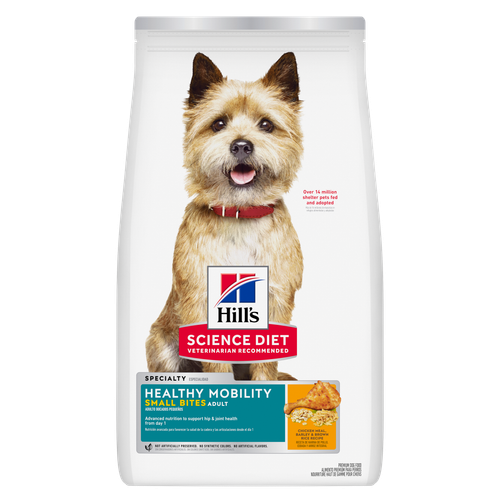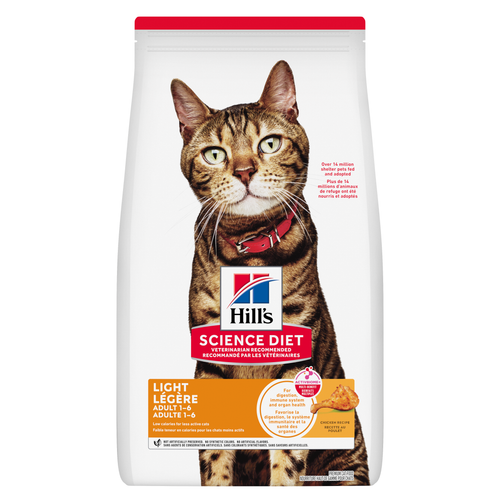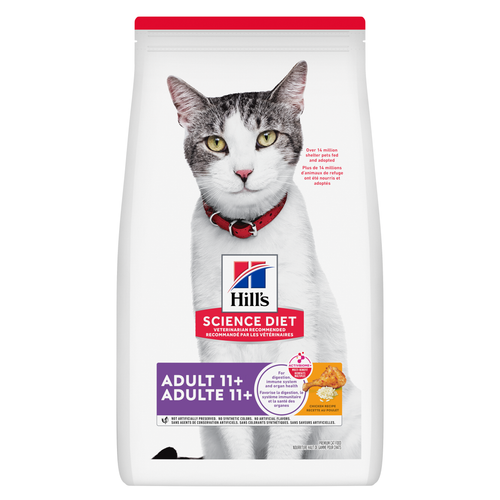
-
Find the right food for your petTake this quiz to see which food may be the best for your furry friend.Find the right food for your petTake this quiz to see which food may be the best for your furry friend.Featured products
 Adult Light Large Breed Chicken Meal & Barley Recipe Dog Food
Adult Light Large Breed Chicken Meal & Barley Recipe Dog Food18% lower calories vs. Science Diet Large Breed Adult
Shop Now Adult Healthy Mobility Small Bites Chicken Meal, Barley & Brown Rice Recipe Dog Food
Adult Healthy Mobility Small Bites Chicken Meal, Barley & Brown Rice Recipe Dog FoodAdvanced nutrition to support hip & joint health from day 1
Shop Now Adult Sensitive Stomach & Skin Small & Mini Chicken Recipe Dog Food
Adult Sensitive Stomach & Skin Small & Mini Chicken Recipe Dog FoodHill's Science Diet Sensitive Stomach & Skin Small & Mini dry dog food is tailored nutrition for Small & Mini dogs while being gentle on stomachs. Nourishes skin & promotes a lustrous coat.
Shop NowFeatured products Adult Light Chicken Recipe Cat Food
Adult Light Chicken Recipe Cat Food20% lower calories vs. Hill's Science Diet Adult
Shop Now Adult Healthy Cuisine Seared Tuna & Carrot Medley Cat Food
Adult Healthy Cuisine Seared Tuna & Carrot Medley Cat FoodDelicious seared tuna paired with tender carrots in a mouthwatering sauce
Shop Now Adult 11+ Chicken Recipe Cat Food
Adult 11+ Chicken Recipe Cat FoodSupports brain health & beautiful fur. Helps keep immune system, heart & kidneys healthy.
Shop Now -
Dog
- Dog Tips & Articles
-
Health Category
- Weight
- Food & Environmental Sensitivities
- Urinary
- Digestive
- Joint
- Kidney
- Dental
- Cancer
-
Life Stage
- Puppy Nutrition
- Adult Nutrition
- Senior Nutrition
Cat- Cat Tips & Articles
-
Health Category
- Weight
- Skin & Food Sensitivities
- Urinary
- Digestive
- Kidney
- Dental
- Stress
- Cancer
-
Life Stage
- Kitten Nutrition
- Adult Nutrition
Featured articles Importance of DHA in your Pet's Food
Importance of DHA in your Pet's FoodLearn about DHA, Docosahexaenoic Acid, a natural omega-3 fatty acid that is essential in the development of the brain and nervous system in cats & dogs.
Read More Water
WaterDiscover why water is the most important nutrient for your dog or cat to live a healthy life. Find out how much water your pet should consume each day.
Read More Antioxidants
AntioxidantsUnderstand the importance of antioxidants in your dog or cat's food, and how they can help protect your pet and keep them healthy.
Read More -


Do you have an overweight cat? Feline obesity is common, especially in seniors as they lose their natural cat mobility and experience slower metabolisms. However, just because it's common doesn't mean you should overlook it. Feline obesity can compromise quality of life and cause or exacerbate various health concerns.
It can be difficult to recognize your cat's weight issue when you see them every day. This is why it's important to understand healthy body condition and the signs of an overweight cat. When you know what to look for, you can help your cat get the care they need to support wellness and prevent problems down the road.


Tasty Tips
Your Hill’s purchase helps support the Hill’s Food, Shelter & Love program, which provides food to hundreds of shelters across North America.
How Can I Tell if My Cat Is Overweight?
One method to tell if your cat is overweight is to feel along their rib cage. You should be able to feel their ribs beneath a light cushion of fat when applying gentle but firm pressure with your hands. If you have difficulty locating them, your cat may be overweight. If you can't feel your cat's ribs at all, this means they're covered by a thick layer of fat, indicating obesity.
Another common method to evaluate a cat's weight is to assess their body condition score, which categorizes body condition on a scale of one to nine. To try this at home, look down at your cat from above while they're standing. Ideally, the sides of their body will form a straight line, with a slight indent behind the ribs (their waist). If it's difficult to identify their waistline or their body bulges on either side, forming more of an oval shape, your cat is likely overweight or obese.
Your veterinarian can weigh your cat and examine their overall body condition to help you understand where they fall on this scale.

Understanding Ideal Weight: Is 17 lbs Overweight for a Cat?
Since cats can have different builds, there's no magic number for ideal weight. This is why the previously mentioned methods are more popular for assessing healthy body condition. Much like a short person with a petite frame, some cats are naturally tiny. These cats may reach a healthy weight at 7 pounds and be significantly overweight at 12 pounds. Meanwhile, 12 pounds may be the ideal weight for cats with larger frames.
For most cats, 17 pounds is overweight. However, certain large breeds, such as male Maine Coon cats, can weigh 20 pounds and still be considered a healthy weight. Again, there's no magic number. Every cat is unique, and many factors are at play. If you have any doubts, ask your veterinarian.
How Excess Weight Impacts Your Cat
Feline obesity is associated with many adverse health effects and impact quality of life. Your cat may not be able to jump up to tall surfaces like they used to. Obese cats often can't groom themselves sufficiently, particularly toward the back and rear end. This can result in matted fur, skin infections and even urinary tract infections.
Carrying excess weight also strains the joints, which can lead to or worsen existing arthritis in cats. Overweight cats are more likely to experience complications under anesthesia, too. Finally, obese cats are at increased risk of developing feline diabetes mellitus, a chronic illness that often requires lifelong management.

"It can be difficult to recognize your cat's weight issue when you see them every day. This is why it's important to understand healthy body condition and the signs of an overweight cat."

What Is the Life Expectancy of an Obese Cat?
Considering these associated health complications, obesity can take years off your cat's life expectancy. However, while important, weight is only one of several factors influencing longevity. Also, lifespan isn't the only consideration. Even overweight cats who live long lives can experience reduced quality of life. So, no matter how you slice it, preventing cat obesity is worthwhile.

Causes of Cat Weight Gain
The most common cause of cat weight gain is overfeeding. This can happen slowly without you even noticing, especially as cats get older and their metabolisms and activity levels slow down. Older cats have different nutritional needs than young cats. So, continuing to feed your cat the same amount and type of food you always have once they reach middle age may result in weight gain. Typically, older cats become less active and may need less food.
Ask your vet for their cat food recommendations after your cat is spayed or neutered. Their food should account for the associated decrease in your cat's metabolic rate to reduce the risk of putting on excess weight.
Certain medications and medical conditions can also cause weight gain in cats. So, consult your veterinarian if you notice your cat's changing condition.
Risk Factors for Weight Gain
Some cats are at higher risk of becoming overweight or obese. As mentioned earlier, spaying and neutering a cat, while important, can lower your cat's metabolism. Indoor cats are at higher risk of obesity since they generally don't get as much exercise. That said, keeping your cat indoors is still the safest option.
Free feeding your cat — allowing them to graze on a bowl of kibble throughout the day — can also contribute to weight gain. This may be particularly true in multi-cat households since it can be difficult to monitor who eats what, compromising portion control.

Keeping Your Cat at a Healthy Weight
But how do you treat obesity in cats, exactly? Your veterinarian is the best resource to answer this question, as it depends on your cat's unique circumstances. Helping your cat lose weight may include therapeutic nutrition, exercise programs, scheduled feedings and portion control.
Take your cat to their regular veterinary appointments, and schedule an appointment if you have any concerns in the meantime. Your vet can rule out any underlying health issues that could be contributing to weight gain. From there, they can give you guidelines for your cat's ideal weight and recommend a plan to help them get there.


Dr. Karen Louis owns her low stress veterinary clinic near St. Louis. When she's not helping dogs and cats live their best lives, she maintains her blog, VetChick.com, and is an award winning nature photographer.
Related products

20% lower calories vs. Hill's Science Diet Adult

Supports brain health & beautiful fur. Helps keep immune system, heart & kidneys healthy.

Delicious seared tuna paired with tender carrots in a mouthwatering sauce

With delicious chunks in a decadent gravy
Related articles

Discover how to train your cat, starting with very basic first steps that both reward good behavior and discourage the bad.

Discover the benefits of Hill's line of kitten foods and how they provide complete and balance nutrition for growing kittens.

When you adopt a cat, you don't just gain a best friend; you also save her life. Here's why getting a cat from a local animal shelter makes so much sense.

Cats are naturally very clean and chances are your kitten will already have learned how to use the litter box from her mother before she comes to live with you.

See what Vets have to say
Read reviews from the experts and see why Hill's is the #1 Veterinarian Recommended brand.
See what Vets have to say
Read reviews from the experts and see why Hill's is the #1 Veterinarian Recommended brand.


